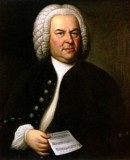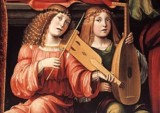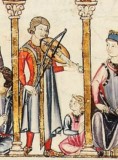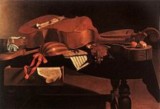Ancient and Baroque Music
VERSION FRANCAISE DISPONIBLE. VEUILLEZ CLIQUER SUR L'ICONE (BAS DE PAGE)
Early music generally includes medieval music (500–1400) and Renaissance music (1400–1600), but can also include Baroque music (1600–1750).
Originating in Europe, early music refers to a broad musical period that marks the beginning of Western classical music.
Medieval music generally refers the music of Western Europe during the Middle Ages, from approximately the 6th to 15th centuries.
The first and longest major era of Western classical music, medieval music includes composers of a variety of styles, often centered around a particular nationality or composition school.
The lives of most medieval composers are generally little known, and some are so obscure that the only information available is what can be inferred from the contents and circumstances of their surviving music.
Baroque music refers to the period or dominant style of Western classical music composed from about 1600 to 1750.
The Baroque style followed the Renaissance period, and was followed in turn by the Classical period after a short transition (the galant style).
The Baroque period is divided into three major phases: early, middle, and late. Overlapping in time, they are conventionally dated from 1580 to 1650, from 1630 to 1700, and from 1680 to 1750.
Baroque music forms a major portion of the "classical music" canon, and is widely studied, performed, and listened to.
The term "baroque" comes from the Portuguese word barroco, meaning "misshapen pearl".
The works of Antonio Vivaldi, George Frideric Handel and Johann Sebastian Bach are considered the pinnacle of the Baroque period. Other key composers of the Baroque era include Claudio Monteverdi, Domenico Scarlatti, Alessandro Scarlatti, Alessandro Stradella, Tomaso Albinoni, Johann Pachelbel, Henry Purcell, Georg Philipp Telemann, Jean-Baptiste Lully, Jean-Philippe Rameau, Marc-Antoine Charpentier,...

Early music festivals is a generic term for musical festivals focused on music before Beethoven, or including historically informed performance of later works.
The increase in the number of music festivals specializing in early music is a reflection of the early music revival of the 1970s and 1980s.
Many larger festivals such as that an Aix-en-Provence Festival also include early music sections, as do, inevitably, festivals of sacred music; such as the Festival de Música Sacra do Baixo Alentejo, in Portugal.
Although most early music festivals are centered on commercial performance, many include also workshops.
This article includes an incomplete list of early music festivals, which may overlap with topics such as list of Bach festivals, list of maritime music festivals, list of opera festivals, and in some cases list of folk festivals.






